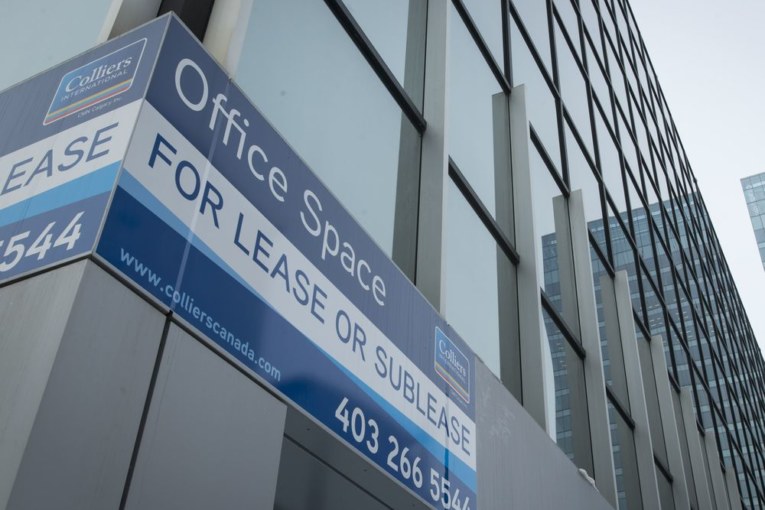
After two years of wringing its hands about a massive erosion in the value of Calgary’s downtown office towers, it seemed city council would finally make a decision Monday to tackle the tremendous tax shift foisted on to other businesses.
Alas, it was too much to expect.
More alternatives for councillors were on the table than at a brunch buffet.
They included shifting some of the burden to homeowners, finding efficiencies in the civic budget, and using “tax room” left behind when the province collects less property taxes for education than what Calgary has budgeted for initially.
After more than eight hours of navel gazing, agonizing and examining eight — yes, eight — different scenarios, they winnowed the field down to two solutions and promptly punted the decision until next week.
The clock is ticking, as 2019 tax bills must be mailed out next month.
“Next week there will be no more dawdling. We have to make the 2019 decision,” Mayor Naheed Nenshi told reporters late Monday. “I would have preferred we had made it today.”
Most frustrating after the day-long deliberation was the depressing reality that whatever council decides, it will only be a short-term plan for dealing with this year’s tax troubles.
Councillors rejected proposals that would have laid out a multi-year strategy to address the problem of rising tax bills pounding businesses due to the annual property reassessment process.
“Businesses want certainty … not addressing that is a big miss,” Calgary Chamber of Commerce CEO Sandip Lalli said Tuesday.
“The current round has really dragged on into the eleventh hour and then some. Council needs to bite the bullet,” added Richard Truscott of the Canadian Federation of Independent Business.
These’s a sense of exasperation in these comments.
For months, council members have called this matter a crisis, searching for ways to soften the blow on businesses from the tax redistribution caused by a drop in assessed values for downtown office buildings.
Since oil prices cratered in 2015, slightly more than 140 properties have lost $14.1 billion of their value amid falling rents and vacant space.
These factors have created a $258 million drop in civic tax revenue, which has been shifted onto commercial property owners outside the core.
In the first quarter of 2019, the downtown office vacancy rate still sat at 26.5 per cent, according to commercial real estate firm CBRE Ltd.
It’s estimated more than half of all non-residential property owners in Calgary are facing double-digit tax hikes this year due to reassessment.
“It comes off your bottom line because you can’t pass it along,” said Kay Gupta, co-owner of Cetus Automotive Repair Centres, noting her property taxes will jump almost 20 per cent this year.
Entrepreneurs point out the large tax increases have been unexpected, making it more difficult to build their own budgets. They are hoping council provides greater certainty about future tax direction.
“It has drastically affected us. Our property taxes went up, in some cases, double,” said P.J. L’Heureux, president of Craft Beer Market, which has six restaurants in the city.
“You are taxing people out of business and what we really need is for people to be in business.”
Groups like the CFIB and chamber have called for significant cost-cutting to the city’s annual $4-billion budget, and shifting some of the tax burden on to Calgary homeowners.
Council understands the magnitude of the matter and is examining difficult solutions.
The two proposals still on the table for next Monday’s meeting — one from Nenshi, the other from Ward 3 Coun. Jyoti Gondek — would start to address the issue by putting more taxes on to homeowners, which is sure to be unpopular with residents.
But it’s necessary to save more companies and jobs from being threatened. Residential property owners currently pay about 45 per cent of municipal taxes, while commercial property owners face 55 per cent.
Nenshi’s plan would see the tax rate for non-residential property owners fall by about two per cent this year, while homeowners would face a 3.45 per cent hike.
Gondek’s pitch is more aggressive — transferring an estimated $92 million in taxes on to residential property owners — but it would include rebates for homeowners.
The mayor’s proposal would also see the creation of a small business sustainment grant to help distressed companies. Administration would come up with criteria on how to use $70 million over two years to help affected companies.
“Businesses that are having a lot of trouble can apply to (it) for a cash grant, money in their pockets, to help their businesses stay vibrant,” the mayor explained.
But can a new program be designed that is fair?
Would it be able to get money out this year when the pain is being most acutely felt?
And what would stop it from propping up businesses that were already failing, instead of targeting firms facing unusually high tax hikes?
“The business community didn’t ask for this,” Gondek said. “They asked for certainty and predictability and they asked us to stop with the Band-Aid solutions.”
The idea of city hall designing a program to pick winners and losers — or in this case, the biggest money-losers that need help — doesn’t sit well with business operators.
Lalli worries it will lead to more regulatory work for companies to apply for grants. She’d prefer to see the city make the overall environment better for all players
“Most businesses are survival of the fittest, who is the most competitive and whoever does a better job survives,” added Gupta. “The city shouldn’t be deciding.”
So many questions still need answers. So much debate has already been held.
Council can’t dodge the unpleasant taxing decisions much longer.
Chris Varcoe is a Calgary Herald columnist.
You can read more of the news on source
